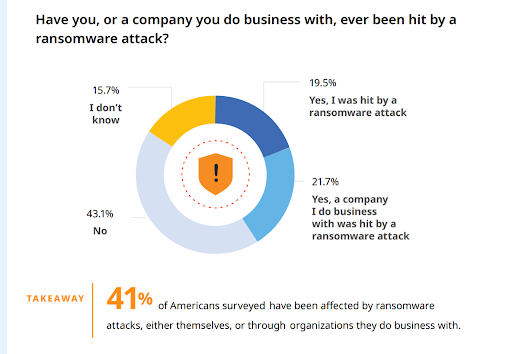A survey conducted by data management firm Cohesity reveals that 55% of the US population believes that companies paying ransoms in cases of cybersecurity breaches only inspire even more attacks and damage.
Cybersecurity attacks are so common that security breaches are heard about almost constantly. Of course as time has gone on, both developers and the general populace has gotten more aware of them, but that doesn’t mean hackers have remained stagnant. Cybercriminals have grown with the times as well, constantly finding new ways to exploit both individual users as well as entire systems. That much is already terrible, mind you. No one wants their precious valuables (typically money or personal data) being leaked to some cybersecurity threat who can in turn do whatever they want with the residual amount. However, what is apparently worse in the eyes of the general populace is how most companies respond to the overall event.
Typically, hackers and the like will contact the companies that they successfully conducted espionage against, and ask for a ransom sum. Upon payment, stolen data is returned and not leaked forwards, allowing companies to maintain their customers’ collective integrity. Of course, customers would still not be happy about the process. 55% of all Americans claim to lose hope in a company that has been subjected to such attacks. Then again, attacks happen with a lot of frequency, and online accessible data is perpetually a potential subject of being looked at or released. Perhaps companies still feel justified in attempts of buying their data back. Well, that too maybe subject to change.
22% of all study participants stated that they would also lose hope in a company that decided to pay the ransom out, even if the end result was attempting to save precious user data. Eh, perhaps everyone is a cynic nowadays. However, it’s just that users believe that any company actively caving into the demands of the figurative kidnappers in this hostage situation has no backbone and is therefore unreliable. Users also expect attacks to keep on rising and there being more across 2022 than in 2021, showing a bleak outlook towards the future.
Read next: The Best Antivirus Software For MacOS And Android Devices, Both For Home And Business Users
Cybersecurity attacks are so common that security breaches are heard about almost constantly. Of course as time has gone on, both developers and the general populace has gotten more aware of them, but that doesn’t mean hackers have remained stagnant. Cybercriminals have grown with the times as well, constantly finding new ways to exploit both individual users as well as entire systems. That much is already terrible, mind you. No one wants their precious valuables (typically money or personal data) being leaked to some cybersecurity threat who can in turn do whatever they want with the residual amount. However, what is apparently worse in the eyes of the general populace is how most companies respond to the overall event.
Typically, hackers and the like will contact the companies that they successfully conducted espionage against, and ask for a ransom sum. Upon payment, stolen data is returned and not leaked forwards, allowing companies to maintain their customers’ collective integrity. Of course, customers would still not be happy about the process. 55% of all Americans claim to lose hope in a company that has been subjected to such attacks. Then again, attacks happen with a lot of frequency, and online accessible data is perpetually a potential subject of being looked at or released. Perhaps companies still feel justified in attempts of buying their data back. Well, that too maybe subject to change.
22% of all study participants stated that they would also lose hope in a company that decided to pay the ransom out, even if the end result was attempting to save precious user data. Eh, perhaps everyone is a cynic nowadays. However, it’s just that users believe that any company actively caving into the demands of the figurative kidnappers in this hostage situation has no backbone and is therefore unreliable. Users also expect attacks to keep on rising and there being more across 2022 than in 2021, showing a bleak outlook towards the future.
Read next: The Best Antivirus Software For MacOS And Android Devices, Both For Home And Business Users



